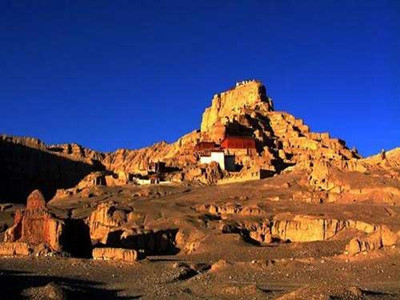In its day, Guge was the Florence of the East.
在兴盛时期,古格王朝是东方的佛罗伦斯。
At the time when Genghis Khan's Mongols were advancing into central Asia and Europe, and the Crusades were being fought in Palestine, Guge was a flourishing centre of commerce, art, religion and political power.
当成吉思汗的蒙古大军挺进中亚及欧洲,当十字军在巴勒斯坦奋战时,古格王朝却是雄霸一方的商业,艺术,宗教及政治中心。
It dominated the strategic crossroads on the Silk Road between central Asia and China, a crossroads for the numerous caravans trading gold, silk, wool and spices.
古格王朝在中亚与中国间的丝路位居枢纽是黄金,丝绸,羊毛及香料。
Guge was the centre of sophisticated art and ideas. a magnet for artisans and intellectuals.
贸易商队的必经之地古格王朝是艺术中心吸引艺匠及知识份子。
It was at the heart of a religious Renaissance and home to some of the greatest Buddhist thinkers of its time.
古格王朝是宗教复兴重镇,是当时若干最伟大佛教思想家的孕育地。
Yet having prospered for seven centuries, this magnificent kingdom disappeared in 1630, leaving only an enigmatic structure, the very last remaining clue to a lost civilization.
然而在兴盛了七个世纪后,古格王朝却在1630年消失,只留下一座难解的古城供人凭吊消失的古文明。
These are the first ever photographs of the Guge kingdom.
这些是古格王朝首次被拍摄的照片。
They were captured in 1933 by an Italian explorer Giuseppe Tucci.
时间为1933年,拍摄者为义大利探险家吉尔瑟皮·图奇。
Tucci was the first westerner to document these magnificent ruins.
图奇是第一位记载古格王朝遗址的西方人。
Tucci was awestruck by what lay before him, he wrote, "In front of us, the whole hillside is covered with tremendous ruins.
图奇对古格王朝遗址啧啧称奇,他写道:在我们前方整个土山是一座巨大的遗址。
A dead city, which seems to be keeping visual over a tormented waste of stone."
一座建立在荒芜土山上的无人古城。
Tucci's visit to the ruins of Guge unearthed no clues to its demise.
图奇的古格遗址走访并未挖掘到古格王朝消失的秘密。
译文属可可原创,仅供学习交流使用,未经许可请勿转载












